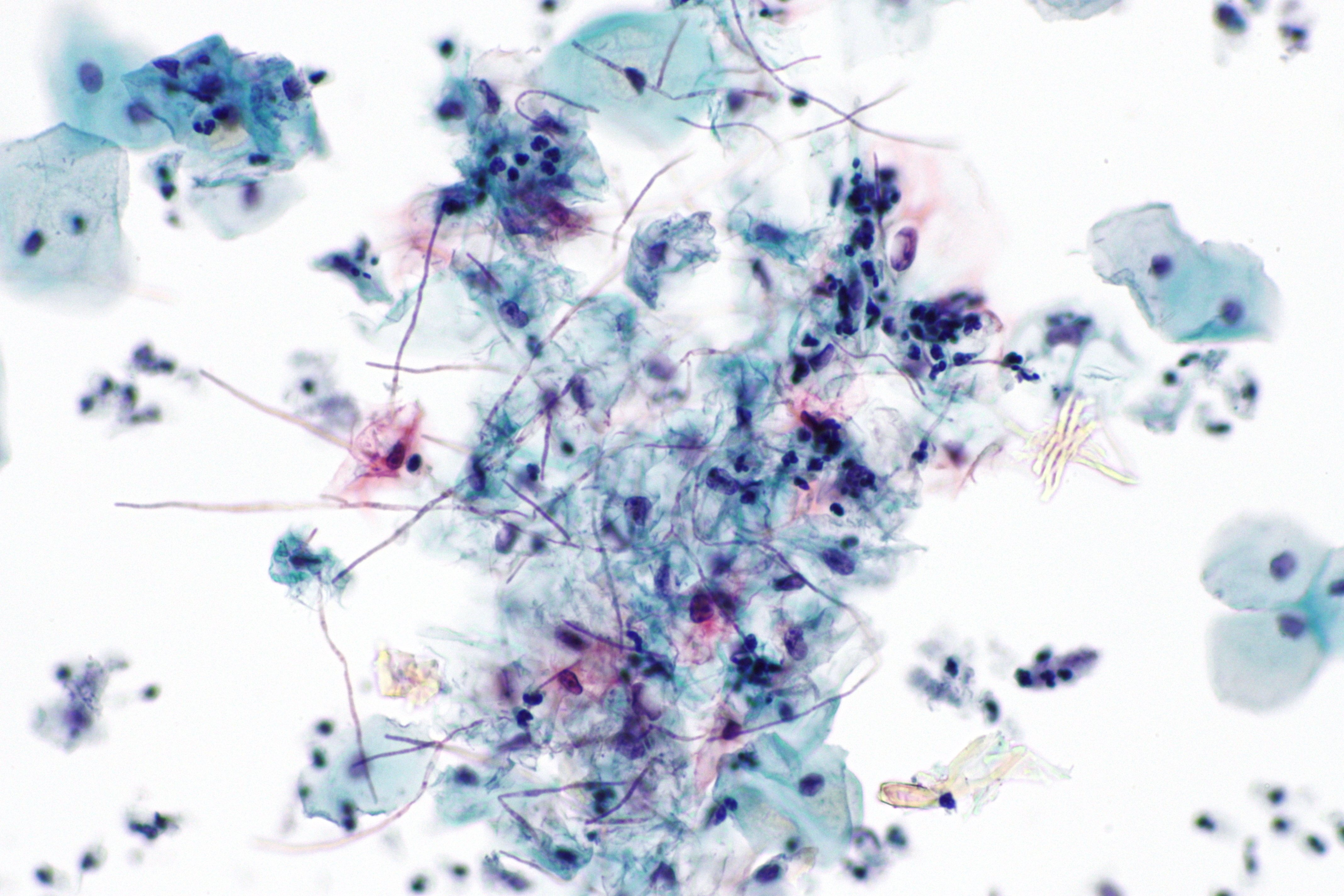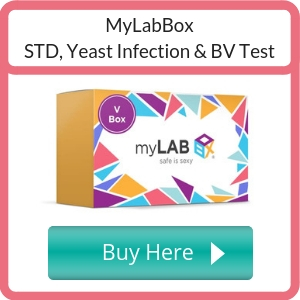Is it HPV or Yeast Infection?
Have you been experiencing abnormal vaginal symptoms recently? Do you worry you might be suffering from some kind of sexually transmitted disease such as HPV or is it just a vaginal yeast infection?
In this article, I’ll tell you what are the most common symptoms of both as well as how you can test for both infections to be 100% sure what you’ve got, so you can treat it effectively.
What is HPV?
HPV stands for human papillomavirus. There are 150 kinds of HPV viruses, some of them cause papillomas (warts) and some can cause cancer of the mouth, throat, anus, cervix, and penis.

Human Papilloma Virus Cells
It’s transmitted by vaginal, anal and oral sex. HPV may go undetected for years and symptoms may or may not develop a long time after being infected.
HPV is very common and most sexually active people are bound to get infected at least once in their lifetime. The good news is that often HPV infection disappears on its own without causing any health issues, if it doesn’t, then it may cause genital warts or cancer.
What are the Symptoms of HPV?
Although in many cases HPV doesn’t produce any symptoms for many years, some infected women may notice:
- Warts in your genital area, which are painless soft bumps that resemble little cauliflowers.
If you notice warts, you don’t need to worry. They are easy to treat and they don’t cause any complications. The HPV virus that doesn’t give any symptoms is the one that can cause cancer.
How to Test for HPV?
As some HPV types can go unnoticed for years, and they may be very dangerous, it’s crucial to get tested. Every sexually active person should get tested for HPV in order to prevent cancer. The best way to get tested is to visit a sexual health clinic. If you prefer more privacy, you order a test kit online.
The MyLabBox send you a test kit which makes it easy for you to take swabs from your vagina and mouth. Put them back in the attached prepaid envelope and send it back. Within 48 hours you’ll receive the results by email and you can have a free physician consultation in case you test positive.
What I like about MyLabBox is that it makes it easy for you to get tested from the comfort of your home and the results come back quickly and are 100% accurate. Go ahead and order your HPV test kit today!
How to Treat HPV?
There’s no way to treat HPV at the moment, however, you can do a lot to prevent it. There are vaccines available that will make you immune to HPV, apart from that you can:
- avoid sexual contacts with many people and practice sex in monogamous relationships
- although condoms are not 100% effective in HPV prevention, they will dramatically cut your risk of contracting it
- use condoms and oral dams during oral sex

What is a Vaginal Yeast Infection?
Vaginal yeast infections are caused by Candida yeast cells which naturally occur in the vagina. Sometimes, when the vaginal bacterial balance is disturbed, these cells start proliferating out of control causing unpleasant symptoms.
Vaginal yeast infections are not dangerous for your health, but they can be really uncomfortable and painful, so it’s important to start your treatment before the symptoms become unbearable.
What are the Symptoms of Vaginal Yeast Infection?
The most common signs of a vaginal yeast infection include:
- Swollen and reddened vulva
- Vaginal discharge which may be which and white or watery and transparent
- Vaginal itching and burning
- A burning sensation during urination
- Pain during sexual intercourse

Candida Cells
How to Test for Vaginal Yeast Infection?
The best way to test for a vaginal yeast infection is to go to see a gynecologist. He or she will take your vaginal swabs and send them to the laboratory or check them under a microscope.
It’s important to get properly tested because vaginal yeast infection symptoms can sometimes be confused with bacterial vaginosis, chlamydia, gonorrhea or trichomoniasis, the latter three are sexually transmitted diseases.
If you cannot get checked by a doctor, you can order a vaginal health test that will allow you to get tested from home and exclude other causes of your symptoms, such as BV or an STD.
How to Treat a Vaginal Yeast Infection?
If you decide to self-treat a vaginal yeast infection, there are plenty of OTC vaginal yeast infection treatments to choose from. The two most popular are:
Monistat 7
Monistat 7 contains Miconazole, a very effective compound against Candida cells that cause a yeast infection. You insert one applicator with cream into your vagina every night before going to bed for seven consecutive nights.
You should see great improvement after a few days, but be sure to continue with your treatment for a full week to avoid developing a new yeast infection within a few weeks.

BoriCap Boric Acid Suppositories
BoriCap is a completely natural treatment that uses boric acid. Boric acid has been shown to be very effective against different Candida strains that cause a yeast infection, as well as bacteria that cause bacterial vaginosis and trichomoniasis.
The treatment takes one week and you should use one suppository in the morning and one in the evening. Your symptoms will ease after the first night, but don’t interrupt your treatment, carry on for 7 days for the best, long-lasting effect.
Conclusion
Although it’s difficult to confuse HPV with a vaginal yeast infection, it’s always best to get tested to know exactly what’s causing your vaginal symptoms. Even if you’re not experiencing any symptoms, it’s always a good idea to get tested for HPV if you’re sexually active.
If you test positive for cancer-causing HPV type, your doctor will be able to do procedures that will kill precancerous cells on your cervix. So it’s always worth to get tested.
On the other hand, if you’ve got a vaginal yeast infection, it’s easy to treat with over the counter medications and fortunately, it’s not dangerous for your health apart from causing extremely unpleasant symptoms which will affect your mood, productivity and sex life. So, if you’re sure it’s a yeast infection, start your treatment as soon as possible!
If you’ve got any questions or comments, or you’d like to share your story, please use the comment section below.



I just found out I was test for HPV I have been with the same person for 20 years how can u get hpv
Hi I just wanted to tell you that you’ve done a great job with this article. You emphasize the importance of testing and it’s absolutely crucial in cancer prevention. I didn’t have a clue that I had HPV. As I was getting chronic yeast infections, my doctor recommended doing a comprehensive STD test, just to rule out other potential causes of my symptoms. That’s how I found out that I had HPV and thanks to that I get my cervix checked regularly and if anything worrying happens, I’ll be able to get rid of pre-cancerous cells before they turn into cancer. My HPV had nothing to do with my yeast infections, but I’m so glad the situation forced me to get tested and I can now take better care of my health. So get STD tested ladies, even if you don’t get any symptoms!
Hi Rachel, thank you for commenting. I think each of us should get tested for STDs at least once. For those who often change sexual partners it should be done regularly. In the long run, it can actually save your life, so it’s really worth it. All the best!
How do you treat positive HPV! I have anal cancer and am going they chemo and radiation!! Will I need additional treatment after this?
Hi Renee, it all depends on the type of HPV you’ve got. It’s possible that you may be carrying a HPV strain that doesn’t cause any symptoms, it may just go away on its own. If it’s a cancer causing type, you’ll need regular PAP tests to check for precancerous cells, so that they can be treated before they develop into cancer. If it’s a wart causing type, your doctor will prescribe you a treatment for warts. The HPV infection may be handled differently in cancer patients, so your doctor is the best person to ask. I wish you all the best with your treatment!